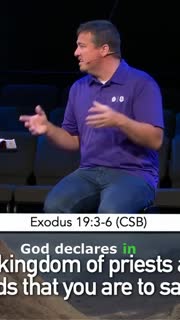Embracing God's Love Through the Ten Commandments
Devotional
Sermon Summary
Bible Study Guide
Sermon Clips
### Quotes for Outreach
1. "God declares in this covenant that you are my people and I have loved you. You have seen how I've sacrificed for you. You've seen how I've carried you. You've seen how I've brought you out of slavery. You know the promise that I'm preparing a place for you and I'm calling you to love me in return. God the Father loves, loves his people and he instructs them on how to love them in return." (37 seconds)
2. "Love God and love people. It sounds so simple and we make a disaster out of both, don't we? So the question that we're asking ourselves this morning is how then do I love the Father well? And so God instructs in the first four of these words, these Ten Commandments. He says this and God spoke all these words saying verse one of chapter 20, I am the Lord your God who brought you out of the land of Egypt and out of the house of slavery and you shall have no other gods before me or beside me, right?" (37 seconds)
3. "If we fail to love God first, failing here, we will fail everywhere. Let me restate that in the affirmative. To succeed in every other arena of life, to succeed as a husband, to succeed as a father, to succeed in my work, to succeed in my play, to succeed in my school, to succeed in my finances, to succeed, in my popularity, to succeed in my position, to succeed in any other arena of life. If we fail here, if we do not love God first, then you and I are missing God's very best for us regardless of what the fluff on the outside actually looks like." (62 seconds)
4. "When I practice Sabbath and take a break once a week, it reminds me of my own need for God's grace, His salvation and His redemptive work in my life. When I practice Sabbath and take a break once a week, it reminds me to focus on God's mission because work has value, but there is work to be done that has eternal significance. When I practice Sabbath and take a break once a week, it reminds us that we are people who were created to worship. It is the way we are designed. You will worship something. The question is, will we worship the right someone?" (45 seconds)
5. "The world will tell you, keep working, do the next thing, produce a little bit more, be a little bit better. And at the end, you might be spent and you might be drained, but they'll keep asking. But God is not like the gods of this world. He says, I am sufficient. I am what you need. You can come to me and I will give you life." (33 seconds)
### Quotes for Members
1. "Are we a people who have genuine affection for the Father is a question that we need to be asking ourselves because this first part of the Ten Commandments is loving God and the second part of the Ten Commandments is learning how to love others and that we would be the people who love God ought to be something that we love. Something that is absolutely primary is core, is the essence of who we are as followers of Jesus and yet we don't always get this right." (43 seconds)
2. "I think about Colossians chapter one, which begins to work out for us. Who Jesus is in the fullness of God and it talks about Jesus' work in creation and it uses this word that through the years my heart has latched onto where it says that Jesus is preeminent in everything. He is far and exceedingly above all else and that there is nothing that is in comparison or competition with him. With him are there things that are in competition with Jesus in my life. Is he first and far above everything else in my life?" (54 seconds)
3. "I love Ephesians chapter two where it talks about who we were, dead, disgusting, separated, but now we are redeemed and lavished with grace and are called by his name. Actually, the most oft-used phrase for those who are followers of Jesus is not that we are Christians, but that we are in Christ. And if we are in Christ, we ought to look like Christ. If I'm loving Christ, my life will look like Christ. Love God first. It's all his. I'm all his." (41 seconds)
4. "When I practice Sabbath and take a break once a week, I'm acknowledging God's right to rule and direct my life as He see fits because His ways are higher than mine. When I practice Sabbath and take a break once a week, it's a reminder that God's great desire for my life is not mechanical responses, completing a checklist, but meaningful, loving, intimate relationship with God who created the universe." (45 seconds)
5. "How are you loving God, church family? Are you loving him well? Is he first? Is it all his? Are you all his? Are you walking by faith in his sufficiency? And if not, maybe this morning during our time of response, there's an opportunity just to come forward and to lay it at the altar. God, I've heard these words of yours. And like a father who's loving me and instructing me, I don't just want to hear them. I want to experience them in their fullness, walk in them by faith, be refreshed by them, sustained by them, because I know you are well. I know what I need." (66 seconds)
Ask a question about this sermon
1. "God declares in this covenant that you are my people and I have loved you. You have seen how I've sacrificed for you. You've seen how I've carried you. You've seen how I've brought you out of slavery. You know the promise that I'm preparing a place for you and I'm calling you to love me in return. God the Father loves, loves his people and he instructs them on how to love them in return." (37 seconds)
2. "Love God and love people. It sounds so simple and we make a disaster out of both, don't we? So the question that we're asking ourselves this morning is how then do I love the Father well? And so God instructs in the first four of these words, these Ten Commandments. He says this and God spoke all these words saying verse one of chapter 20, I am the Lord your God who brought you out of the land of Egypt and out of the house of slavery and you shall have no other gods before me or beside me, right?" (37 seconds)
3. "If we fail to love God first, failing here, we will fail everywhere. Let me restate that in the affirmative. To succeed in every other arena of life, to succeed as a husband, to succeed as a father, to succeed in my work, to succeed in my play, to succeed in my school, to succeed in my finances, to succeed, in my popularity, to succeed in my position, to succeed in any other arena of life. If we fail here, if we do not love God first, then you and I are missing God's very best for us regardless of what the fluff on the outside actually looks like." (62 seconds)
4. "When I practice Sabbath and take a break once a week, it reminds me of my own need for God's grace, His salvation and His redemptive work in my life. When I practice Sabbath and take a break once a week, it reminds me to focus on God's mission because work has value, but there is work to be done that has eternal significance. When I practice Sabbath and take a break once a week, it reminds us that we are people who were created to worship. It is the way we are designed. You will worship something. The question is, will we worship the right someone?" (45 seconds)
5. "The world will tell you, keep working, do the next thing, produce a little bit more, be a little bit better. And at the end, you might be spent and you might be drained, but they'll keep asking. But God is not like the gods of this world. He says, I am sufficient. I am what you need. You can come to me and I will give you life." (33 seconds)
### Quotes for Members
1. "Are we a people who have genuine affection for the Father is a question that we need to be asking ourselves because this first part of the Ten Commandments is loving God and the second part of the Ten Commandments is learning how to love others and that we would be the people who love God ought to be something that we love. Something that is absolutely primary is core, is the essence of who we are as followers of Jesus and yet we don't always get this right." (43 seconds)
2. "I think about Colossians chapter one, which begins to work out for us. Who Jesus is in the fullness of God and it talks about Jesus' work in creation and it uses this word that through the years my heart has latched onto where it says that Jesus is preeminent in everything. He is far and exceedingly above all else and that there is nothing that is in comparison or competition with him. With him are there things that are in competition with Jesus in my life. Is he first and far above everything else in my life?" (54 seconds)
3. "I love Ephesians chapter two where it talks about who we were, dead, disgusting, separated, but now we are redeemed and lavished with grace and are called by his name. Actually, the most oft-used phrase for those who are followers of Jesus is not that we are Christians, but that we are in Christ. And if we are in Christ, we ought to look like Christ. If I'm loving Christ, my life will look like Christ. Love God first. It's all his. I'm all his." (41 seconds)
4. "When I practice Sabbath and take a break once a week, I'm acknowledging God's right to rule and direct my life as He see fits because His ways are higher than mine. When I practice Sabbath and take a break once a week, it's a reminder that God's great desire for my life is not mechanical responses, completing a checklist, but meaningful, loving, intimate relationship with God who created the universe." (45 seconds)
5. "How are you loving God, church family? Are you loving him well? Is he first? Is it all his? Are you all his? Are you walking by faith in his sufficiency? And if not, maybe this morning during our time of response, there's an opportunity just to come forward and to lay it at the altar. God, I've heard these words of yours. And like a father who's loving me and instructing me, I don't just want to hear them. I want to experience them in their fullness, walk in them by faith, be refreshed by them, sustained by them, because I know you are well. I know what I need." (66 seconds)









